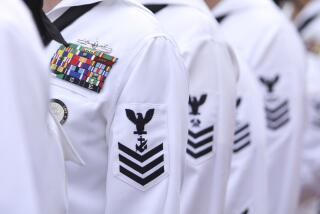The Naval Academy Brass Still Don’t Get It
- Share via
The violent gauntlet at the Tailhook convention and the rape of an Okinawa schoolgirl by three sailors are among the outrages that the Navy “deeply regrets.” But such are the outrages that some among its ranks seem compelled to repeat. In the last month, midshipmen at the Naval Academy have been accused of sexual assault, sexual abuse of a 2-year-old, breaking and entering and running a car theft ring.
In the wake of a cheating scandal three years ago, the academy, under the leadership of Supt. Adm. Charles Larson, instituted an extensive education program to teach character development and ethics. The program comes complete with a video titled “Honor with Admiral Larson” and a journal, Character Quarterly, whose first two issues feature inspirational quotes from famous naval leaders and anonymous articles touting the honorable character of the institution.
To demonstrate that its program is producing the desired effect, the academy conducts periodic surveys of midshipmen, which confirm the program’s success and indicate little dissatisfaction on the part of midshipmen. Although the superintendent insists that these e-mail surveys are completely anonymous, an article in Character Quarterly comments that midshipmen who fail to complete such surveys will have to answer to a superior. If the administration can track down those who fail to respond, surely it can identify anyone who would express dissent or criticism.
When James Barry, a faculty member who has taught the new ethics course, wrote an opinion piece in the Washington Post in March questioning the institutional commitment to practice what the program espoused, he was swiftly removed from the classroom and punitively ordered to produce a report proposing remedies to each of the problems he raised, with no promise and little likelihood that they would be applied. After pressure from the American Assn. of University Professors, Larson allowed Barry to return to the classroom, while insisting upon completion of the retaliatory writing assignment.
Lest anyone at the academy doubt Larson’s outrage, he lambasted Barry in a series of hourlong denunciations before the entire officer staff, before each class of midshipmen and before the entire faculty, military and civilian.
Although Larson insisted that he has stressed to midshipmen the importance of truth over loyalty, the public humiliations staged to discredit Barry explicitly targeted his loyalty. In his address to the faculty, Larson highlighted one of the gravest consequences of Barry’s article, the impression it creates outside the gates that a subordinate doesn’t trust his leader:
“To me [Barry’s article] sends a message. It says, ‘I don’t trust you. . . .We’ll let external forces come in and tell us how to solve this problem.’
“He’s telling me that after 38 years of commissioned service and five years as superintendent, I don’t know what’s going on here. . . I think that’s disloyal to me. I think it’s very disloyal to the institution, and I never like having people work for me that do that, and I don’t think any of you would either. . . . He betrayed me.”
Barry spoke the truth as he saw it. He had tried for many months and in 11 different memos sent up “the chain of command” to bring his concerns to the attention of academy leaders. A public institution whose leaders so fear the scrutiny of the public that they would stage pre-emptive denunciations to deter future critics is a fragile one indeed.
Leaders teach by example, Larson insists. What lesson has he taught midshipmen in his handling of James Barry? That the Naval Academy is a world unto itself that works very hard to present its disciplined, polished “dress uniform” image and that any member who reveals another picture of the place will be ridiculed and punished.
What midshipmen should learn from this series of breakdowns in honor at the academy, from the subsequent notoriety in the press and from the hysterical reactions of their leaders is that the walls of their closed institution are not impermeable and that even its leaders must be responsive to the values and criticism of the public. If not, the Naval Academy will become even more of an anachronism in a nation that expects honesty, however embarrassing at times, on the part of the men and women who secure it from danger in this post Cold War world.
More to Read
Sign up for Essential California
The most important California stories and recommendations in your inbox every morning.
You may occasionally receive promotional content from the Los Angeles Times.










